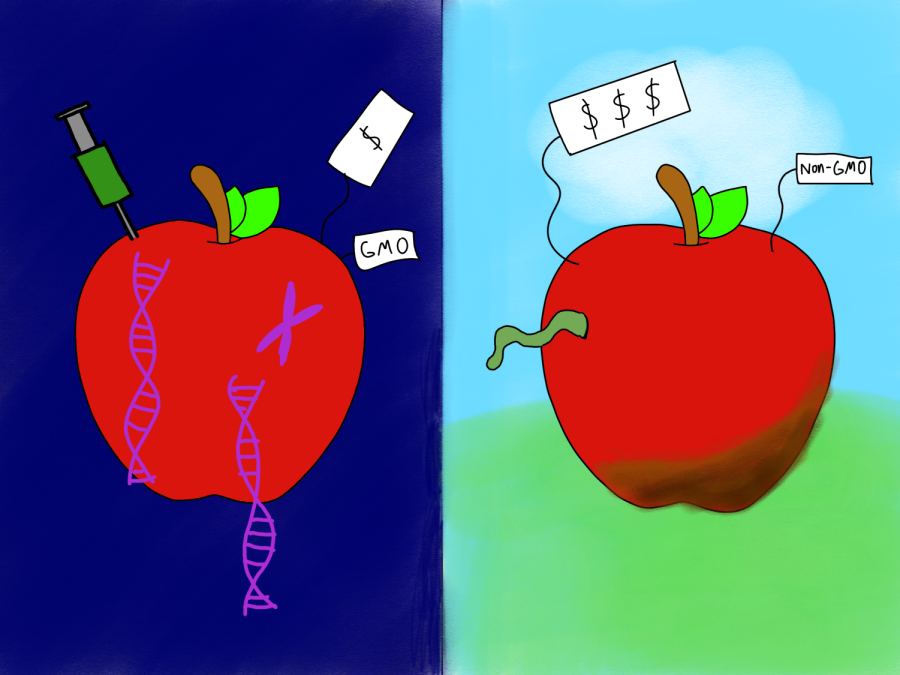Non-GMO Foods: Stuff or Fluff?
Non-genetically modified organisms (Non-GMO) foods and drinks are a huge industry. Non-GMO is any organism that has not been genetically altered through modern genetic engineering techniques. The non-GMO industry was valued at approximately 577 billion USD according to Fortune Business Insights, and it is expected to over double to 1.2 trillion by 2028.
What is the reason for this unprecedented rise in demand? This is primarily because of smart marketing by non-GMO producers, as consumers see non-GMO foods as a healthier, environmentally friendlier, and more ethical alternative to GMOs.
Humans have been selectively breeding animals for millennia to create more offspring with desirable traits. A prime example of this is the different breeds of dogs, which all originate from the same ancestor but look wildly different due to artificial selection.
However, modern genetic engineering technologies such as Clustered Regularly Interspaced Short Palindromic Repeats (CRISPR) allow for the precise cutting and editing of DNA segments to implant the desired genes into an organism. Selective breeding, humanity’s traditional method of altering the genes of a species, is not counted as genetic modification.
Non-GMO foods constitute any plant or animal product whose genes have not been altered through modern gene editing technology, but for a producer to put a non-GMO label on their crops, all aspects of cultivation have to be from non-GMO sources. By law, all organic foods in the US are non-GMO, which includes the prohibition of GMO seeds, and feeding cows GMO feed.
Why is there so much concern about GMO foods that cause many to seek non-GMO products? The biggest concerns are that they are carcinogenic, provoke allergies, alter human DNA, and are toxic for humans to consume. Many anti-GMO organizations peddle such information to spread the notion that non-GMO foods are better.
However, according to the US Food and Drugs Administration (FDA), none of these claims are actually true. There has been no evidence to suggest that GMO foods cause cancer, with some studies even suggesting that some GMO modifications have preventive effects for cancer and other diseases. Though there is some limited evidence of some genes altered in GMOs possibly relating to allergic reactions, the chance is very minimal. Also, there are many international and national guidelines in place to prevent modified allergens from reaching the public market.
Finally, while it is true that some plants have been genetically modified to produce their own pesticide, the potential risks are offset since farmers use fewer artificial pesticides overall. Pesticides are often much more toxic for human consumption and more environmentally disruptive than GMOs.
Some evidence does suggest that GMOs may be harmful to the environment. Unintended cross-breeding of GMOs and their wild counterparts is a real issue, especially for plants. Modified genes including those that give plants resistance to parasites have been found in the wild, which could pose an issue to the natural balance of ecosystems.
However, this risk is minimized when farmers are taught proper ways of isolating their crops. Also, there are types of GMOs that are intentionally made sterile to prevent contamination, though purchasing sterile seeds—“terminator seeds”—every year may be financially burdensome to farmers.
Nutritionally, non-GMO foods are identical to GMOs in most regards, with some GMO foods such as modified soybeans even being nutritionally superior. And since GMOs are far cheaper than non-GMOs, it is far more cost-efficient for consumers to purchase GMO foods.
Though there may be some risk of genetically modified genes contaminating the wild, the risk is minimal, and most of the hype surrounding non-GMO foods is exaggerated and false. There are no significant nutritional, environmental, or health benefits to non-GMO foods, and they end up costing a lot more for consumers. Non-GMO foods are and will continue to be a huge industry, but with proper research, consumers can see through the fluff and make wiser purchasing choices.

Paul is a senior managing editor for Tiger Times. He likes running at night and enjoys the night city view. He watches way too much Youtube and loves watching...

